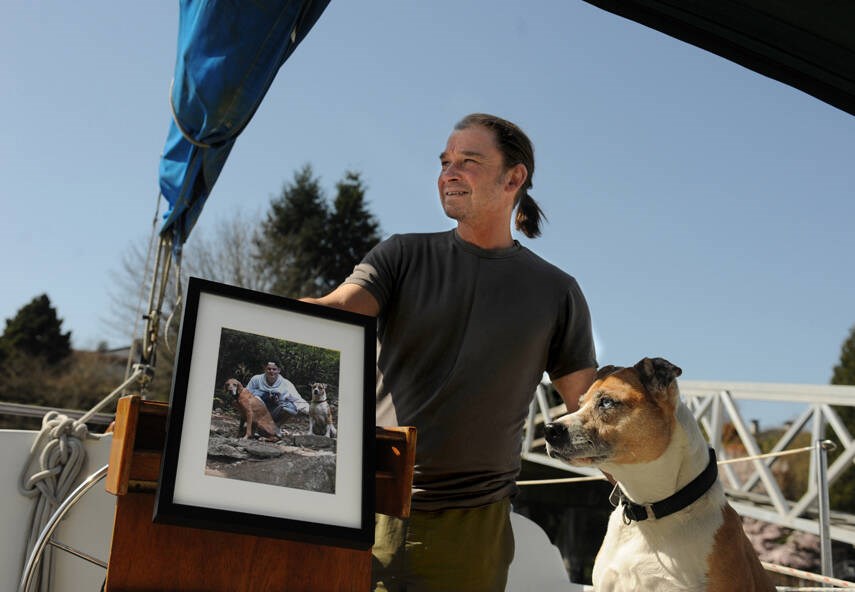When Matthew Witt’s son Sebastian came to live on the North Shore at nine years old, he took to playing soccer right away. He’d played it before, while growing up with his mother’s extended family in Costa Rica, but there it was much more informal.
Here, “he got to have a real uniform and real referees,” said Witt.
Later Seb spent two years taking skating lessons so he could finally join a minor hockey team.
When he was older, Seb and his friends would go out on Witt’s 14-foot sailboat and drop crab traps for the day.
It’s the same sailboat where Matthew and Seb were to head out on a week-long father and son trip together in May of 2015.
“We had been out on shorter trips. But that was going to be our first big one,” said Witt.
But the trip never happened.
Four days before they were due to leave, Seb was found dead of an opioid overdose in the family home, his dog Rio by his side. He was just 20 years old.
It’s the same boat where Witt – who has since moved from the North Shore – recently shared memories of his son with one of Seb’s closest friends, who recently got engaged.
Such moments are bittersweet. “His friends are getting married, having kids,” said Witt. “I’ll never see him do that.”
Witt hopes that by continuing to speak about his loss, it’ll help people to see drug overdose deaths don’t just happen to “other” types of people in other places.
Growing up, Seb laughed a lot, said Witt. “He was very funny. Very sharp.”
But when he got into his teen years, “We noticed changes in his behaviour.”
“At first, I thought he was staying up too late and being a teenager. But eventually, you know, it became obvious that it was something more.”
Eventually Seb told his dad and stepmom he’d been taking drugs. It had started when a friend was prescribed a painkiller for a sports injury and shared it with his friends. “A few of them started experimenting with Oxycontin. I don’t think they really had any idea what they were doing. From there it eventually led to heroin and fentanyl and the whole show.”
At the time, Witt was working as a firefighter in Surrey. “We started to get these [calls to] overdoses that weren’t responding normally” he said. “So we heard about fentanyl, and we were googling it to try to find out what it was.”
His parents struggled to find Seb help, eventually finding a sympathetic doctor who got him on Suboxone.
He graduated from Rockridge Secondary, then went to live with family in Costa Rica for a year.
When he returned to the North Shore, Seb seemed to be doing well.
But then one night, something happened. Seb relapsed after two years, using drugs alone in his room.
His stepmom found him dead the next day. “I got the call at work,” said Witt. “It’s not something you get over.”
Seb’s friends and Witt’s own friends and family have always been supportive.
But there were also, in the years that followed, conversations with people who didn’t know how his son had died, who talked about addiction, “in that old school way, that it’s a moral lapse and a criminal matter,” said Witt. “There’s a lot of stigma around that.”
Witt found support in a North Shore chapter of Compassionate Friends, a group for parents whose children have died. When he first joined, Witt remembers being one of only two or three people whose children had died of an overdose. But over the several years he attended, that number grew. “Maybe half of the group had lost children to opioids or fentanyl.”
Working as a first responder was another reminder of the opioid reality. “When we get that call at 6:30 in the morning for an overdose, it’s usually in someone’s house. Someone was alone. It’s already over by the time we get there. That’s the typical thing. It’s not people lying on the sidewalks on Hastings. It’s trades workers, young men. But so often it’s that shame and stigma and going off and hiding somewhere and overdosing. There’s no one there with Naloxone. There’s no one there to call 911.”
It’s frustrating to Witt that society is slow to change.
He supports recent moves to decriminalize small amounts of hard drugs and advocates with the group Moms Stop The Harm for a safe supply of drugs – an idea he knows still faces significant opposition.
“It’s part of, I think, bringing it into the open and dealing with it instead of trying to sweep it under the rug and pretend it’s a problem for fucked-up people,” he said. “We have people from all walks of life – parents, children, brothers, sisters – who are getting sucked into this.”
Change is coming slowly, Witt believes.
But it wasn’t fast enough for his son. Or for other families going through similar heartbreaks now. “I’m sure there’s someone who lost somebody already today,” he said.
When people ask Witt these days if he has children, “I say I do but he’s not alive anymore,” he said. “It puts an abrupt end to most conversations.”
“I tell them it’s OK. I say, ‘Please say his name.’ I’ll tell you about him. That’s how we keep him alive in our hearts.”
This article is part of an in-depth, provincewide journalistic effort by Glacier Media to examine the scope, costs and toll of the opioid and toxic drug crisis in British Columbia – a public health emergency that has taken at least 11,807 lives since 2016. If you or someone you know is in an emergency, call 911. If you need help with substance abuse, call the 乌鸦传媒 government's alcohol and drug information and referral service at 1-800-663-1441. It's available 24 hours a day.



